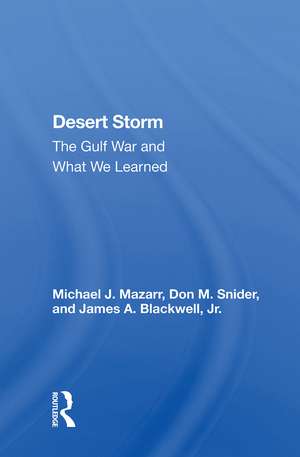Desert Storm: The Gulf War and What We Learned
Autor Michael J. Mazarren Limba Engleză Hardback – 7 iun 2019
| Toate formatele și edițiile | Preț | Express |
|---|---|---|
| Paperback (1) | 317.10 lei 3-5 săpt. | +15.70 lei 5-11 zile |
| Taylor & Francis – 7 dec 2020 | 317.10 lei 3-5 săpt. | +15.70 lei 5-11 zile |
| Hardback (1) | 766.26 lei 6-8 săpt. | |
| Taylor & Francis – 7 iun 2019 | 766.26 lei 6-8 săpt. |
Preț: 766.26 lei
Preț vechi: 1103.99 lei
-31% Nou
Puncte Express: 1149
Preț estimativ în valută:
146.67€ • 159.37$ • 123.28£
146.67€ • 159.37$ • 123.28£
Carte tipărită la comandă
Livrare economică 21 aprilie-05 mai
Preluare comenzi: 021 569.72.76
Specificații
ISBN-13: 9780367004903
ISBN-10: 0367004909
Pagini: 222
Dimensiuni: 146 x 222 mm
Greutate: 0.57 kg
Ediția:1
Editura: Taylor & Francis
Colecția Routledge
Locul publicării:Oxford, United Kingdom
ISBN-10: 0367004909
Pagini: 222
Dimensiuni: 146 x 222 mm
Greutate: 0.57 kg
Ediția:1
Editura: Taylor & Francis
Colecția Routledge
Locul publicării:Oxford, United Kingdom
Cuprins
Symbols Used in Figures -- An Unexpected War -- The Failure of Deterrence -- The Failure of Diplomacy -- The Failure of Compellence -- The Air Campaign -- One Hundred Hours -- The Gulf War and U.S. Military Strategy
Descriere
From Saddam Hussein's first bold threats in 1990 to the stunning ground phase of Desert Storm in early 1991, the crisis in the Gulf captured the world's attention. This high-tech, low-cost war was televised nightly from beginning to end, accompanied by on-the-spot interpretations of strategy and its implications. But what did we learn from this crisis? Did the United States bungle its attempts at discouraging Saddam's aggressive actions, or is deterrence simply not a reliable foreign policy tool? Are chemical weapons truly the "poor man's atom bomb"? Does the war represent a good model for future crises, or did circumstances make this war more of an anomaly than a precedent? How did the ail-volunteer U.S. force perform? By combining exciting, detailed vignettes of the crisis with insightful discussions of its consequences, this book opens up an informed debate concerning the true military and geopolitical lessons of the conflict. Representing a distillation of the best thinking on defense and foreign policy in Washington, Desert Storm also incorporates the testimony of the inside players during the crisis—the people who actually planned and fought the war. Combining academic rigor and in-depth military expertise, the authors challenge the complacency of the emerging conventional wisdom regarding the conflict, taking us beyond mere chronicling and instant analysis to a riveting reenactment of the war and the serious consideration of its long-term implications.
